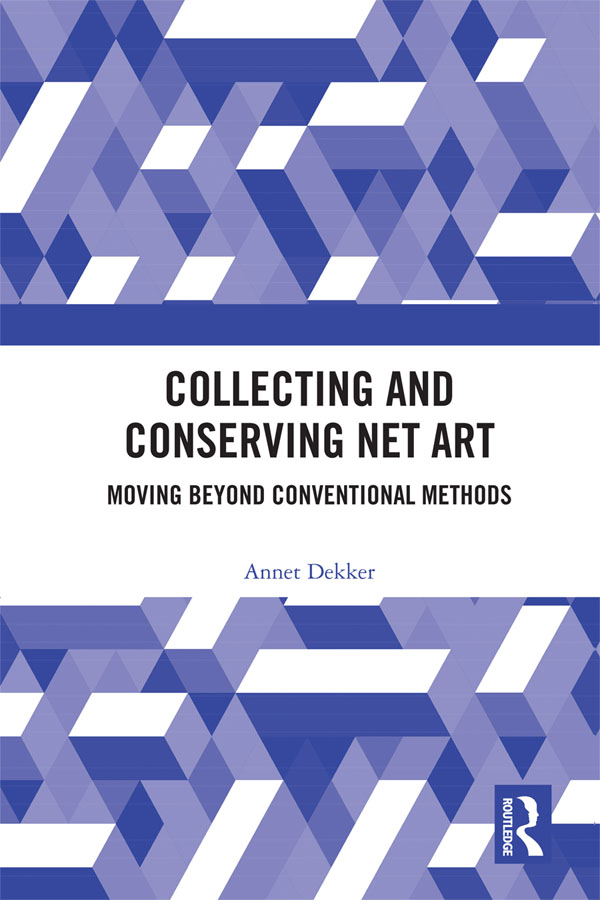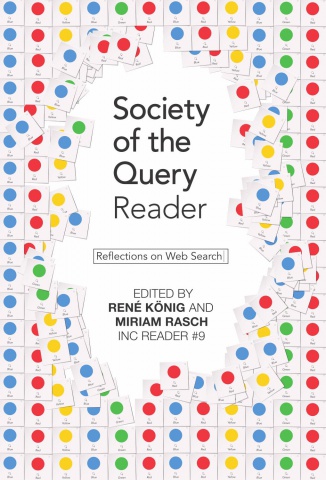Annet Dekker: Collecting and Conserving Net Art: Moving beyond Conventional Methods (2018)
Filed under book | Tags: · archive, archiving, art documentation, conservation, document, internet art, net art, networks, preservation, software, software art, web

“Collecting and Conserving Net Art explores the qualities and characteristics of net art and its influence on conservation practices. By addressing and answering some of the challenges facing net art and providing an exploration of its intersection with conservation, the book casts a new light on net art, conservation, curating and museum studies.
Viewing net art as a process rather than as a fixed object, the book considers how this is influenced by and executed through other systems and users. Arguing that these processes and networks are imbued with ambiguity, the book suggests that this is strategically used to create suspense, obfuscate existing systems and disrupt power structures. The rapid obsolescence of hardware and software, the existence of many net artworks within restricted platforms and the fact that artworks often act as assemblages that change or mutate, make net art a challenging case for conservation. Taking the performative and interpretive roles conservators play into account, the book demonstrates how practitioners can make more informed decisions when responding to, critically analyzing or working with net art, particularly software-based processes.
Collecting and Conserving Net Art is intended for researchers, academics and postgraduate students, especially those engaged in the study of museum studies, conservation and heritage studies, curatorial studies, digital art and art history. The book should also be interesting to professionals who are involved in the conservation and curation of digital arts, performance, media and software.”
Publisher Routledge, 2018
ISBN 9780815382416, 0815382413
x+192 pages
Dariusz Jemielniak: Common Knowledge? An Ethnography of Wikipedia (2013/2014) [Polish, English]
Filed under book | Tags: · anthropology, collaboration, ethnography, floss, free software, knowledge, knowledge production, peer production, software, trust, web, wikipedia

“With an emphasis on peer–produced content and collaboration, Wikipedia exemplifies a departure from traditional management and organizational models. This iconic “project” has been variously characterized as a hive mind and an information revolution, attracting millions of new users even as it has been denigrated as anarchic and plagued by misinformation. Has Wikipedia’s structure and inner workings promoted its astonishing growth and enduring public relevance?
In Common Knowledge?, Dariusz Jemielniak draws on his academic expertise and years of active participation within the Wikipedia community to take readers inside the site, illuminating how it functions and deconstructing its distinctive organization. Against a backdrop of misconceptions about its governance, authenticity, and accessibility, Jemielniak delivers the first ethnography of Wikipedia, revealing that it is not entirely at the mercy of the public: instead, it balances open access and power with a unique bureaucracy that takes a page from traditional organizational forms. Along the way, Jemielniak incorporates fascinating cases that highlight the tug of war among the participants as they forge ahead in this pioneering environment.”
Polish edition
Publisher Poltext, Warsaw, 2013
ISBN 9788375612851
376 pages
English edition
Publisher Stanford University Press, 2014
ISBN 0804789444, 9780804789448
312 pages
Review (Piotr Konieczny, The Signpost, 2014)
Review (Forbes, George Anders, 2014)
Życie wirtualnych dzikich: netnografia Wikipedii (Polish, trans. Wojciech Pedzich, 2013)
Common Knowledge? An Ethnography of Wikipedia (English, 2014)
René König, Miriam Rasch (eds.): Society of the Query Reader: Reflections on Web Search (2014)
Filed under book | Tags: · algorithm, google, internet, memory, search, software, technology, web

Looking up something online is one of the most common applications of the web. Whether with a laptop or smartphone, we search the web from wherever we are, at any given moment. ‘Googling’ has become so entwined in our daily routines that we rarely question it. However, search engines such as Google or Bing determine what part of the web we get to see, shaping our knowledge and perceptions of the world. But there is a world beyond Google – geographically, culturally, and technologically.
The Society of the Query network was founded in 2009 to delve into the larger societal and cultural consequences that are triggered by search technology. In this Reader, which is published after two conferences held in Amsterdam in 2009 and 2013, twenty authors – new media scholars, historians, computer scientists, and artists – try to answer a number of pressing questions about online search. What are the foundations of web search? What ideologies and assumptions are inscribed in search engine algorithms? What solution can be formulated to deal with Google’s monopoly in the future? Are alternatives to Google even thinkable? What influence does online search have on education practices? How do artists use the abundance of data that search engines provide in their creative work? By bringing researchers together from a variety of relevant disciplines, we aim at opening up new perspectives on the Society of the Query.
Contributors: Aharon Amir, Vito Campanelli, Dave Crusoe, Angela Daly, Vicențiu Dîngă, Martin Feuz, Ulrich Gehmann, Olivier Glassey, Richard Graham, Mél Hogan, Ippolita, Kylie Jarrett, Min Jiang, Anna Jobin, Phil Jones, Simon Knight, Dirk Lewandowski, M.E. Luka, Astrid Mager, Martina Mahnke, Andrea Miconi, Jacob Ørmen, Martin Reiche, Amanda Scardamaglia, Anton Tanter, and Emma Uprichard.
Publisher Institute of Network Cultures, Amsterdam, 2014
INC Reader, 9
Creative Commons Attribution NonCommercial ShareAlike 3.0 Unported License
ISBN 9789081857581
292 pages
Website of the network
Publisher

